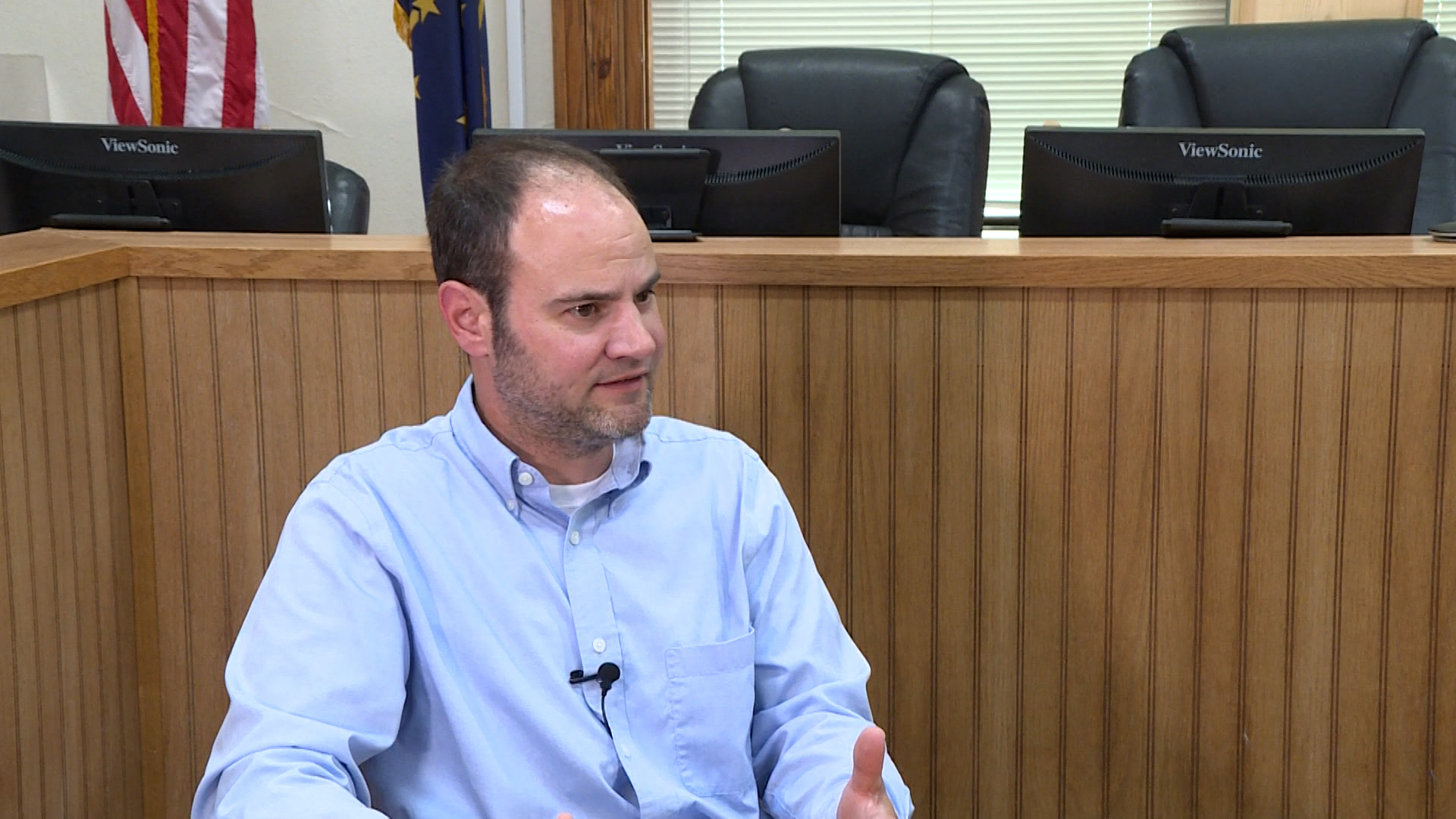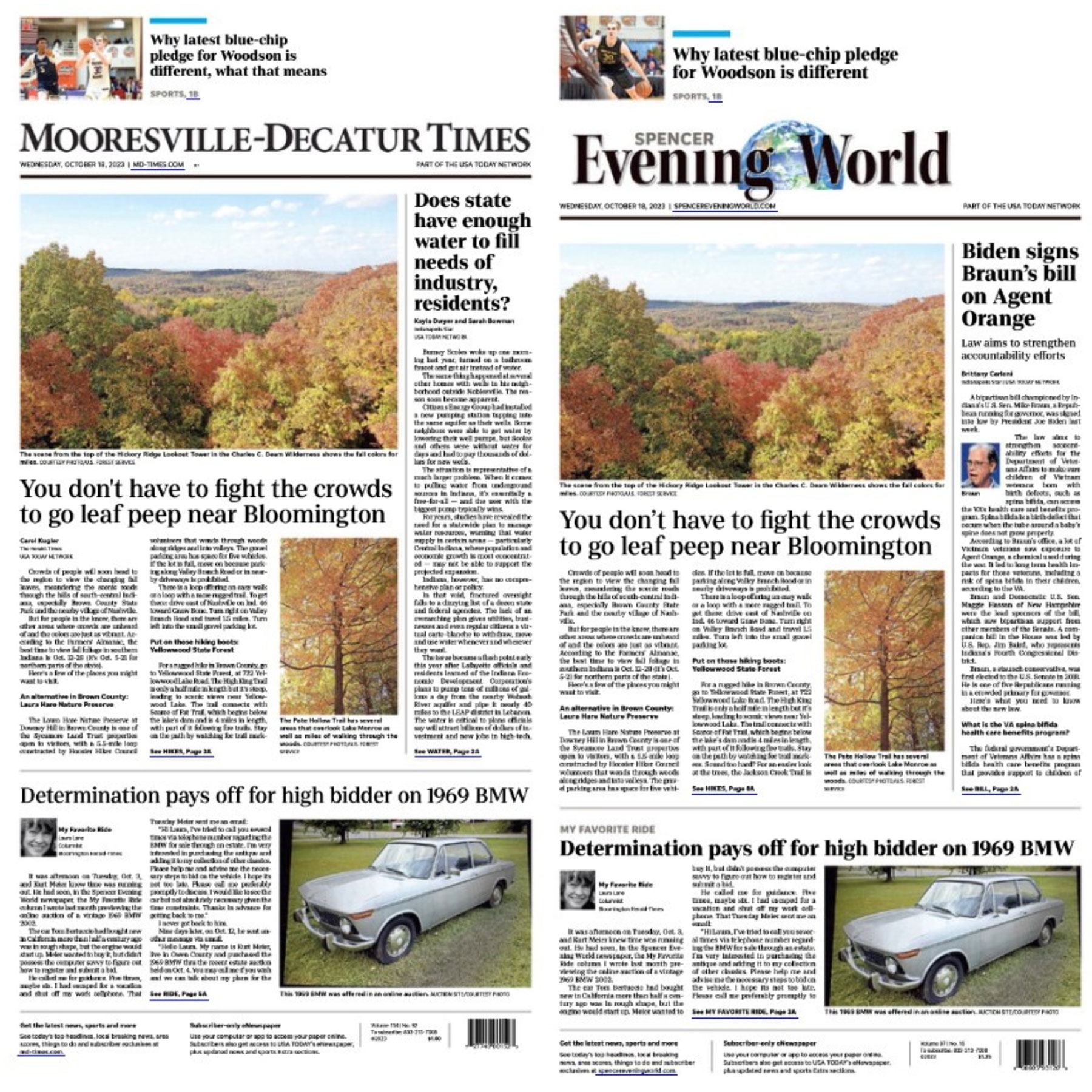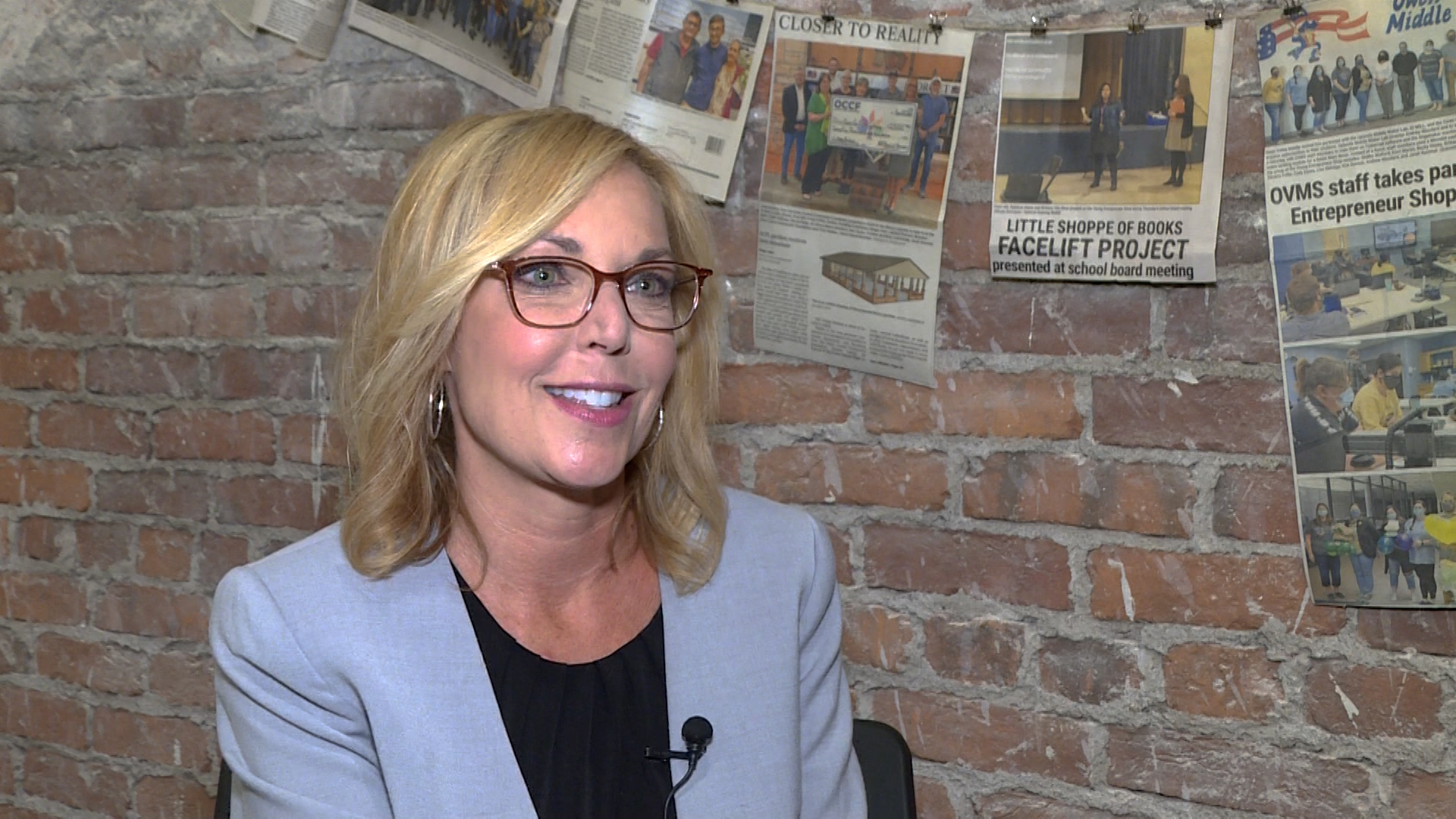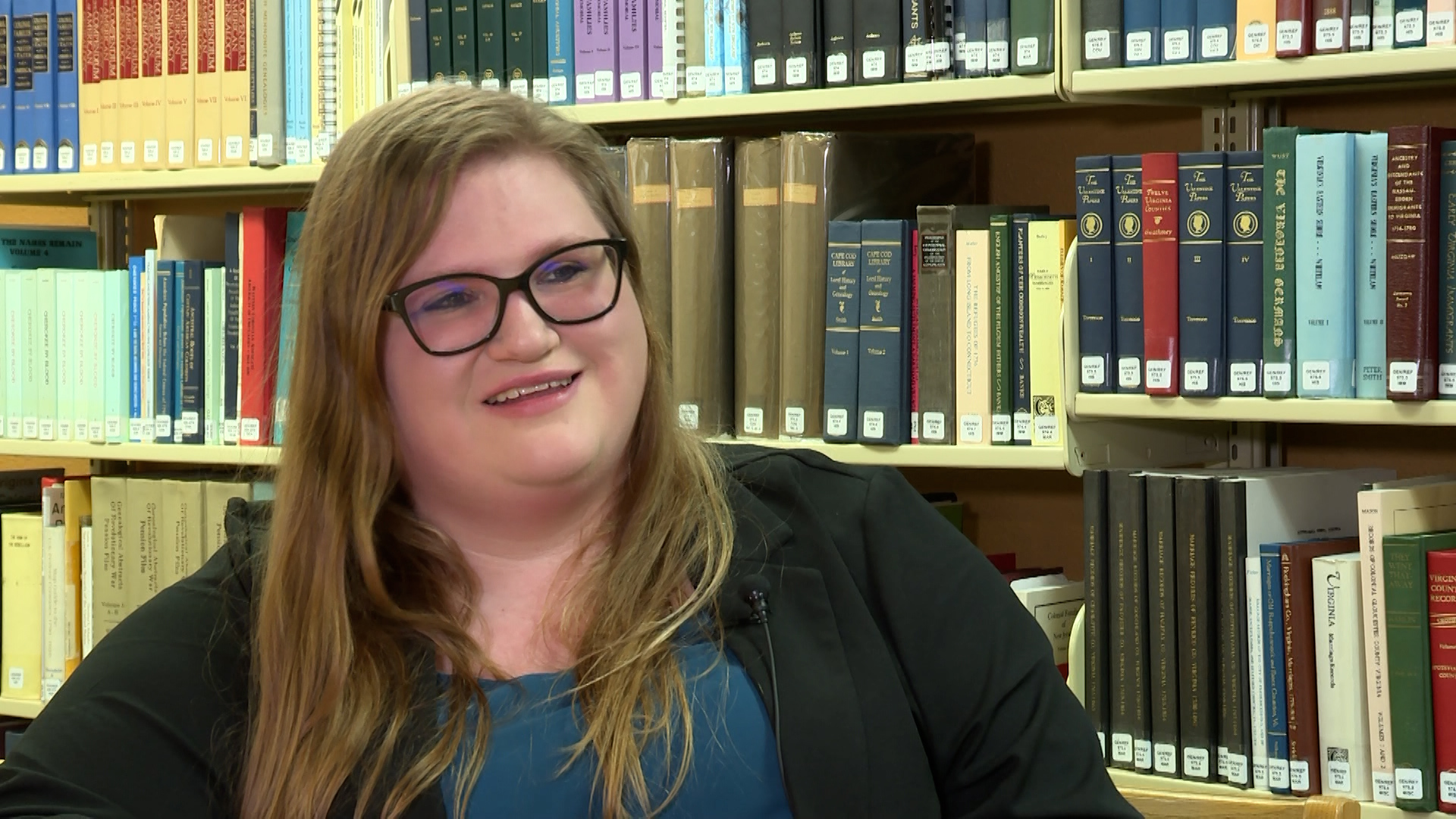Chapter 8
Local case study: Owen County citizens, Community Foundation step in
In Owen County, a former newspaper reporter gets funding help to launch a local news website to counter a ghost newspaper the used to be filled with local news.
Sarah Vaughan
In rural Owen County, community leaders are witnessing first-hand the challenges that come with misinformation generated through social media – misinformation that is rising in the wake of the local newspaper’s decline.
Owen County Council member Anton Neff remembers, in years past, seeing a reporter from the Spencer Evening World regularly attend local government meetings. A front-page article would follow a day or two later explaining the issues and officials' actions, he said. The paper provided regular and accurate reporting both officials and area residents could rely on.

Anton Neff
“But over time, as that individual or reporter no longer attends, then we notice a lot of gaps in information. The citizens don’t know what’s going on,” Neff said.
County residents can watch Owen County government meetings on YouTube and local officials are using their own social channels for outreach. But does social media take the place of a local newspaper?
"There's no way I would call that a substitute," Neff said. "It's certainly an enhancement in a time when there aren't a lot of other options."
Until 2019, the Spencer Evening World was owned by local families, its own employees and — most recently — the family-owned newspaper chain The Hoosier Times. In addition to local government coverage, the paper offered the kind of local stories and information area residents relied on, including obituaries, community events, business stories, education and school sports coverage. But since 2019, under GateHouse, and later Gannett, the paper has been reduced to a weekly and now much of its content comes from outside Owen County.

The Spencer Evening World and the Mooresville Decatur Times display almost the same front page on Wednesday, October 18, 2023.
Social media may be the news source residents most consistently turn to now, Neff said, but what they often don't get from social channels is context: background information, alternative ideas that were proposed, and the discussion that preceded a decision.
“Was a board like the commissioners or the council selecting the best of all worst-case options?” he pointed out.
When this potentially inaccurate, unvetted and unedited information from social media saturates the public, “that affects their decisions that they make in their lives, or their opinions of local government officials and how government works,” Neff said, “and that's tough. That's a really tough situation for everybody.”
Janet Rummel, CEO of the Owen County Community Foundation, has seen unhealthy social media interaction since the local newspaper's decline.
“Often that is the only place that people can turn to for any type of local information and we’ve seen a lot of terrible things happen lately,” she said. When pressed for an example, she mentioned a story posted about "something that happened at a local school and it's not the real story.”
“And so then people start commenting and thinking they know what is going on when, in fact, they don’t,” she said. “And it just leads down a rabbit hole often then that ends in hate, to be honest.”
She also sees polarization from national politics eroding the area’s sense of community.

Janet Rummel
“So it used to be that a lot of us around here with very widely differing political views on national issues would still come together and rally around each other, around a local issue or a local event,” she said. “But I’ve seen that start to fall apart a little bit. And so we really are seeing a larger divide among our populace here and a lot of it has to do, again, with where they’re getting their news.”
Rummel said having a newspaper as a trusted source of information “created a shared culture – things for us to rally around.”
The Community Foundation and other nonprofits are experiencing their own difficulties living with a ghost paper. People generally don't know as much about what area nonprofits are doing, Rummel said, and so they have difficulty attracting donors, volunteers and grant applicants.
“We saw a 400 percent decrease in applicants for our Lilly scholarship application,” Rummel said, despite the nonprofit using its own social media to promote it. “But we used to be able to put that in the newspaper and we would get really high-quality grant applications.”
Focus groups held as part of the foundation’s strategic planning process paved the way for a commitment to fund a news start up.
“One of the top three issues that emerged as most important in every single focus group regardless of age, demographics or income was the need for a reliable local news source,” Rummel said.
Enter The Owen News project, a news startup being led by former Spencer Evening World journalist Nicole DeCriscio Bowe.
Originally from Ft. Wayne, DeCriscio Bowe worked for the Spencer Evening World for a little over two years, during which she fell in love with the small town of Spencer and its close-knit community.
“Part of why I love Spencer is I see it as, and see the further potential to be, kind of that picturesque small-town America, you know, where you walk down the square and everybody knows everybody and um…anything that you would think would be in a Hallmark movie.”
She was a GateHouse employee for most of her time with the Evening World but when the company took over Gannett in 2019, DeCriscio Bowe was laid off. She continued as a freelancer, supplementing the work of the paper’s one remaining reporter.

Nicole DeCriscio Bowe
“I realized that whatever I was contributing as a freelancer was the only local content. So then the next question was, ‘Is this still serving the community?’”
Because the community was missing a lot of local news and citizens told her so.
“What community members have said that they missed most are the police blotter and the obits,” she said. “And I think that says a lot about one of the main roles that often is forgotten about a small-town paper and that is to notify folks when people die and when they're arrested. And it's not that they don't want other content — they absolutely do. And so, you know, people say, ‘well, we don't know what's going on anymore’ or ‘we don't see pictures of our kids anymore.’ When I worked at the Evening World, we talked a lot about refrigerator rights — and that is, you know, clipping out the newspaper to put it on the refrigerator — and that is very, very important in a small community and it's missing. There's not local content, there's not photos even of things in Owen County let alone kids in Owen County.”
Community leaders, including a local librarian, a former editor of the Evening World and DeCriscio Bowe worked together to establish The Owen News as a nonprofit with “a mission to strengthen Owen County and promote civic engagement.” The Community Foundation provided a large impact grant plus a $10,000 planning grant and helped them qualify for matching grants from the Knight Foundation.
DeCriscio Bowe is recruiting citizen journalists and training them how to report with the help of an online course called Earn Your Press Pass. And, because of the consistent flow of misinformation in local news generated from a variety of sources — some anonymous — she also feels a responsibility to teach the community at large “what ethical and responsible journalism looks like” to defend against skepticism or mistrust.
Two boards guide the nonprofit’s effort. The first is a diverse community board that includes an assistant school principal, an attorney, a local artist and farmer, and a former Spencer Evening World editor. A journalism advisory board of both working and retired journalists from around the nation will provide guidance, expertise and resources, DeCriscio Bowe said.
"We know that a thriving community depends on a reliable, trusted local news source."
“We have a member who works for the Boston Globe, one that is an editor of a niche publication, a podcaster that worked for CNN for a while…”
The Owen News debuted its digital site in August; the goal is to have a printed paper sometime in 2024. But the plan has a very basic challenge: there are few printers left in the state.
Still, providing a print product is crucial in this rural county where many residents don’t have internet access, though the county is working to provide it more widely thanks to state and federal funding. And, not everyone uses social or accesses digital sites.
“Our ultimate goal is to try to keep all of our content free and rely upon donors and advertising revenue and other creative fundraising opportunities that are available to nonprofits,” DeCriscio Bowe said.
The Community Foundation has included The Owen News in its 2024 funding priorities.
“We know that a thriving community depends on a reliable, trusted local news source,” Rummel said. “We knew going into this that it was going to be a multi-phase, multi-year project, right? And so if it takes three years, you know, I think that's doable.”
Can The Owen News stand while facing some of the same challenges that caused other rural newspapers to fall, such as declining advertising revenue and subscriptions?
DeCriscio Bowe thinks the difference is that the community has now seen what it’s like to not have a truly local newspaper.
“We've had listening sessions and time at [famers’ market] booths and a community needs assessment and everything that we're doing is being guided by the community voice,” she said.
“It’s about having something that the community can be proud of. For the community, of the community, about the community and by the community.”
Chapter 9: Local case study: Monroe County options, ideas growing in wake of news cuts »
•••
Officials at Gannett would not talk to WFIU/WTIU for these stories. They sent a statement attributed to Jill Bond, news director of The Herald-Times.
Paper Cuts The reporting is supported by a grant from the Poynter Institute, a non-profit journalism school and research organization in St. Petersburg, Fla., and the Omidyar Network.











